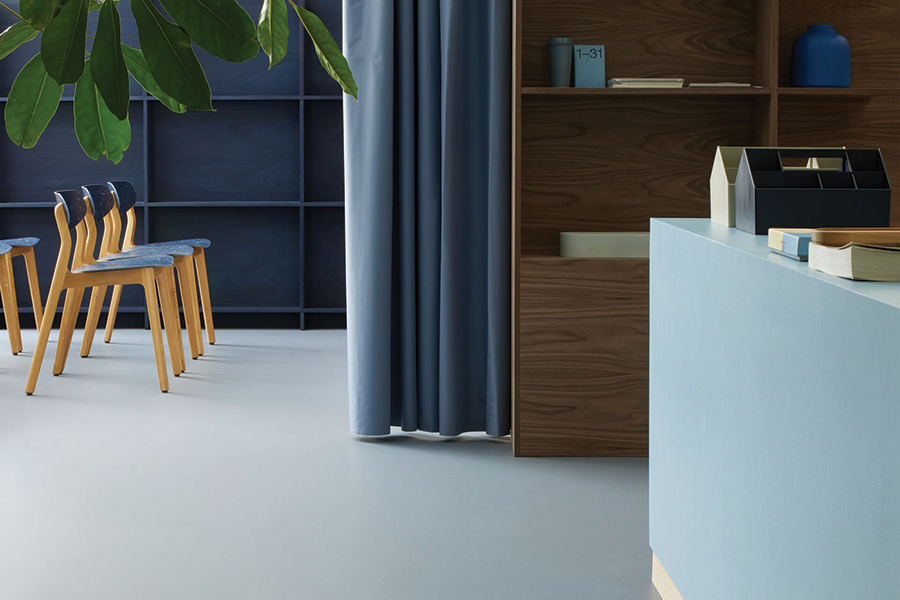WITH a target for the country to be net zero by 2050, set by government, sustainability is at the forefront of many companies’ minds for 2023. So, what can the flooring industry do to be more environmentally conscious? Here I’ll explain what they’re doing as a company to minimise their impact on the environment.
According to studies, the construction industry accounts for nearly a third of the world’s overall waste and at least 40% of the world’s carbon dioxide emissions – and this includes the flooring industry. As one of the largest surface areas in most projects, flooring can have a big impact on the carbon footprint generated by a building.
In fact, it was estimated in 2018 that about 400,000 tonnes of carpet waste was generated in the UK, of which around only 44% was diverted away from landfill sites. This means at least over half of all flooring waste currently doesn’t get reused or recycled.
To help the flooring industry to become more circular, it’s imperative that the ways in which flooring is manufactured and disposed of changes.
As a global manufacturer of high-quality commercial and residential floorcoverings, Forbo is committed to becoming more sustainable. While it has a set of objectives to reach its overall sustainability goal, the company has already achieved several accomplishments.
One such accomplishment being a 70% decrease in carbon emissions per sq m of product produced between 2004 and 2021. Additionally, 23% of Forbo’s flooring is made up of recycled materials by weight, with some products containing as much as 89% recycled material. Forbo’s product lines are also manufactured using 100% safe and traceable raw materials in factories using 100% green electricity, further reducing its carbon footprint.
Part of the work Forbo does to become more sustainable focuses on the entire supply chain, looking from start to finish with its products and services. This includes ensuring the materials used to make its products aren’t only taken from sustainable sources, but also that those collecting them are being treated fairly, which is why Forbo was the first flooring manufacturer to receive the international, auditable SA8000 social certification standard for social performance and guaranteed fair treatment of all workers across its worldwide supply chain.
Thanks to our commitment to sustainability, Forbo’s portfolio offers some truly unique sustainable solutions.
Forbo’s own brand of linoleum flooring, Marmoleum, is climate positive from cradle to gate, without the need for offsetting. A bio-based floor, Marmoleum is manufactured from 97% natural raw materials. This includes flax, jute and linseed oil, which are obtained from annual crops, and wood flour and pine rosin that are sourced from sustainably managed forestry plantations.
In fact, 61% of the natural ingredients are renewable, of which 29% are rapidly renewable, meaning it will grow back within one year. Marmoleum also boasts 43% reused and recycled content to reduce the demand for virgin raw materials.
The climate positivity of Forbo’s Marmoleum from cradle to gate is confirmed by the independent Environmental Product Declaration (EPD), which shows the CO2 removed from the atmosphere during the growing of its natural ingredients exceeds the CO2 produced in the extraction, transportation and manufacturing processes. For contractors this means that, for example, using Marmoleum on a 10,000sq m project could equate to a 66,200kg/CO2 saving when compared to a PVC vinyl floor.
Forbo’s vinyl flooring is another of its products championing sustainability. With Forbo’s extensive offering of fast flooring adhesive-free solutions in sheet and tile formats, this benefit can really be taken advantage of by flooring contractors to help create a more circular economy, delivering a phthalate-free solution that is not only quick and easy to install, but can also be removed, recycled or reused at the end of its useful service life as it has no adhesive residue.
To help close the materials loop, Forbo is investing in developing closed loop manufacturing processes, such as that at its Ripley site where waste materials from the group can be recycled; indeed, some of Forbo’s vinyl ranges contain 89% recycled content by weight. Its commercial vinyl is completely safe, with low carbon emissions that Forbo declares using third party verified environmental product declarations (EPDs).
Forbo can also claim a high percentage of recycled content by weight for its Tessera carpet tiles too – up to as high as 76%, which can be increased further when produced using the Softbac backing option. It also uses Econyl yarns across many of its carpet tile and Coral entrance system products, which are sourced from waste fishing nets, making for 100% regenerated material.
To continue in this endeavour to be a trusted partner, providing full transparency when it comes to circular flooring solutions and renewable raw materials, Forbo is aiming to increase its renewable energy usage; for example, the Tessera carpet tile factory in Bamber Bridge uses renewable electricity and biogas, as well as continuing to decrease CO2 emissions and evaluating low impact energy supply, as part of its sustainability programme 2025.
The company is also looking at minimising its product and office waste and to maximise the reuse and recycling of any waste generated, to limit landfill and incineration as solutions to its disposal.
In addition to this, Forbo operates a ‘Back to The Floor’ recycling programme, where they collect clean installation off-cuts of Forbo products. These off-cuts can then be recycled back into some of Forbo’s product lines, helping to create a more circular economy. This has the added benefit of saving contractor’s money as collections are free and provide an alternative to landfilling waste flooring.
To learn more about Forbo’s commitment to sustainability, visit https://www.forbo.com/flooring/en-uk/sustainability/going-round/pnjbgb
www.forbo.com
Karen Wilding is marketing communications manager at Forbo Flooring Systems
Please click to view more articles about
> Forbo Flooring Systems <

